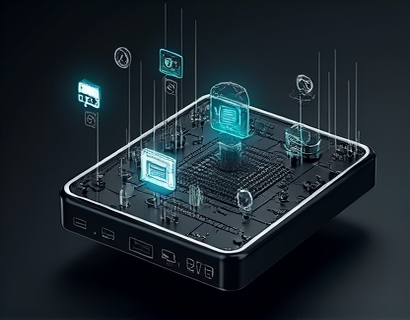Transforming Healthcare with AI-Powered Solutions: Instant Expert Insights and Personalized Medical Support Online
The integration of artificial intelligence in healthcare has ushered in a new era of medical innovation, offering patients instant access to expert insights and personalized medical support through advanced online platforms. This transformation is not just about technology; it's about empowering individuals to take control of their health with informed decisions and enhanced well-being. The advent of AI-driven healthcare platforms marks a significant shift from traditional medical practices, providing a more accessible, efficient, and personalized approach to healthcare.
Understanding AI in Healthcare
AI in healthcare encompasses a broad range of applications, from predictive analytics and diagnostic tools to personalized treatment plans and patient monitoring. These technologies leverage vast amounts of medical data to identify patterns, predict outcomes, and suggest interventions tailored to individual patient needs. The core advantage of AI in healthcare lies in its ability to process and analyze complex data sets far beyond human capabilities, leading to more accurate diagnoses and effective treatments.
Instant Personalized Medical Insights
One of the most compelling features of AI-powered healthcare platforms is their capacity to provide instant personalized medical insights. Users can input their symptoms, medical history, and other relevant information to receive immediate, expert-level advice. This instant access to personalized insights is transformative, especially for individuals who may not have easy access to healthcare professionals or who require quick assessments outside of regular clinic hours.
For instance, a user experiencing chest pain can input detailed symptoms and receive guidance on whether to seek immediate medical attention or follow-up care. This immediate feedback loop not only alleviates anxiety but also ensures that critical conditions are addressed promptly. The platform's algorithms, trained on extensive medical databases, ensure that the advice provided is both accurate and relevant to the user's specific situation.
Expert Advice at Your Fingertips
Beyond instant insights, AI-driven healthcare platforms offer access to expert advice from a network of medical professionals. These experts, including doctors, nurses, and specialists, contribute to the platform's knowledge base, ensuring that the information provided is up-to-date and evidence-based. Users can engage in virtual consultations, ask follow-up questions, and receive detailed explanations of their conditions and treatment options.
The convenience of having expert advice available 24/7 is invaluable. Patients no longer need to wait for office hours or travel long distances to consult with a specialist. This accessibility is particularly beneficial for those in remote areas or with mobility issues, bridging the gap between patients and healthcare providers.
Personalized Medical Support
Personalization is a cornerstone of AI-powered healthcare. Each user's data, including medical history, lifestyle, and genetic information, is analyzed to create a tailored healthcare plan. This approach ensures that the advice and recommendations are not only accurate but also aligned with the individual's unique needs and circumstances. For example, a patient with diabetes can receive a personalized diet and exercise plan based on their specific health metrics and goals.
Moreover, AI algorithms continuously learn from user interactions and feedback, refining the personalized support over time. This adaptive nature means that the platform becomes more effective and relevant as it gains more data, creating a virtuous cycle of improvement and user satisfaction.
Enhancing Patient Engagement and Empowerment
The role of the patient in their own healthcare has never been more critical, and AI-powered platforms play a pivotal role in enhancing patient engagement and empowerment. By providing users with comprehensive information and tools to manage their health, these platforms foster a proactive approach to wellness. Patients can monitor their health metrics, track progress, and make informed decisions about their treatment options.
Educational resources and interactive tools are integrated into the platform to help users understand their conditions better. For instance, interactive diagrams and step-by-step guides can explain complex medical concepts in an accessible manner. This education empowers patients to take an active role in their care, leading to better health outcomes and higher satisfaction.
Timely Support and Crisis Management
Timeliness is crucial in healthcare, especially during medical emergencies. AI-powered platforms are designed to provide timely support, ensuring that users receive immediate assistance when needed. In cases of potential crises, such as severe allergic reactions or acute symptoms, the platform can guide users through emergency protocols and connect them with emergency services if necessary.
The integration of real-time data and advanced algorithms allows the platform to assess the severity of a situation and provide appropriate recommendations. For example, if a user reports symptoms indicative of a heart attack, the platform can advise on immediate actions to take, such as calling emergency services and administering nitroglycerin if prescribed. This rapid response can be life-saving, highlighting the platform's potential to enhance emergency care.
Building Trust Through Reliable Information
Trust is fundamental in healthcare, and AI-powered platforms must ensure that the information provided is reliable and credible. To achieve this, the platforms source data from reputable medical databases, peer-reviewed journals, and expert contributions. The algorithms are designed to filter out misinformation and provide evidence-based advice, reducing the risk of incorrect or harmful recommendations.
Transparency is also key. Users are informed about the sources of the information and the basis for the advice given. This transparency builds trust and allows users to make informed decisions about their health. Additionally, the platforms often include features for users to report any concerns or inaccuracies, fostering a community-driven approach to maintaining the quality of information.
Integration with Existing Healthcare Systems
The success of AI-powered healthcare platforms depends on their ability to integrate seamlessly with existing healthcare systems. This integration ensures a smooth flow of information between the platform and healthcare providers, enabling continuous and coordinated care. For instance, a user's health data can be shared with their primary care physician, allowing for a more comprehensive understanding of their health status and treatment progress.
Interoperability with electronic health records (EHRs) and other healthcare technologies is essential. This integration not only enhances the efficiency of care but also ensures that patients receive consistent and high-quality service across different healthcare settings. The platforms can also alert healthcare providers to critical updates or changes in a patient's condition, facilitating timely interventions.
Addressing Privacy and Security Concerns
Privacy and security are paramount in healthcare, and AI-powered platforms must adhere to stringent standards to protect user data. Compliance with regulations such as the Health Insurance Portability and Accountability Act (HIPAA) in the United States and the General Data Protection Regulation (GDPR) in the European Union is non-negotiable. These platforms employ advanced encryption techniques, secure data storage, and robust access controls to safeguard sensitive information.
Users are informed about how their data is used, stored, and protected, and they have control over their data sharing preferences. This transparency and control are crucial in building user trust and ensuring that individuals feel safe using the platform.
Future Prospects and Challenges
The future of AI in healthcare is promising, with ongoing advancements expected to further enhance the capabilities of these platforms. Machine learning algorithms will become more sophisticated, enabling even more accurate predictions and personalized recommendations. The integration of wearable devices and IoT technologies will provide continuous health monitoring, allowing for proactive management of chronic conditions and early detection of potential health issues.
However, challenges remain, including the need for widespread adoption, user education, and addressing ethical concerns. Ensuring that AI-driven healthcare is accessible to all, regardless of socioeconomic status, is crucial for equitable health outcomes. Additionally, ongoing research and collaboration between technologists, healthcare professionals, and policymakers are necessary to navigate the ethical landscape and maximize the benefits of AI in healthcare.
Conclusion
AI-powered healthcare platforms represent a revolutionary step forward in providing instant expert insights and personalized medical support online. By leveraging advanced technology, these platforms empower individuals to make informed health decisions, leading to enhanced well-being and improved healthcare outcomes. As the technology continues to evolve, the potential for transforming healthcare delivery is immense, offering a brighter, more accessible, and more effective future for all.










































